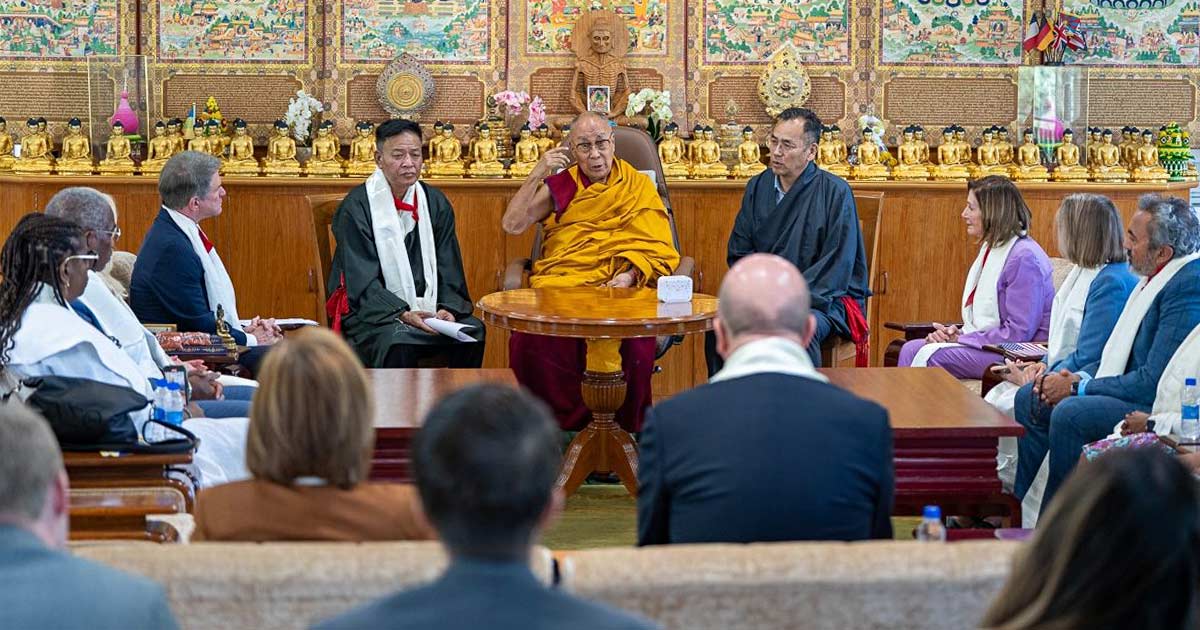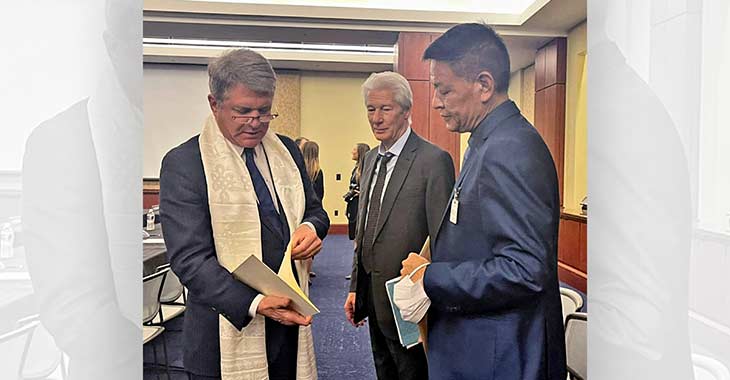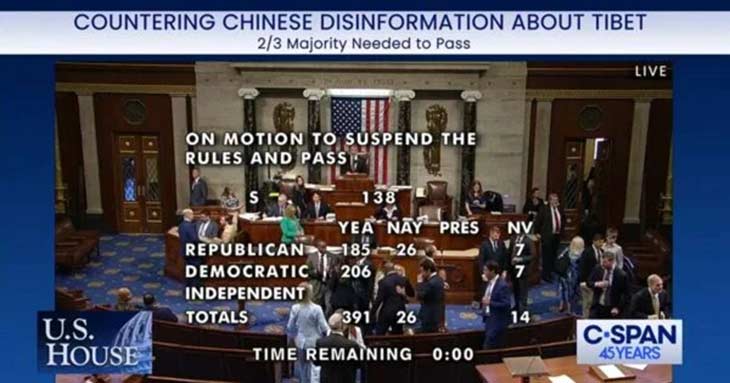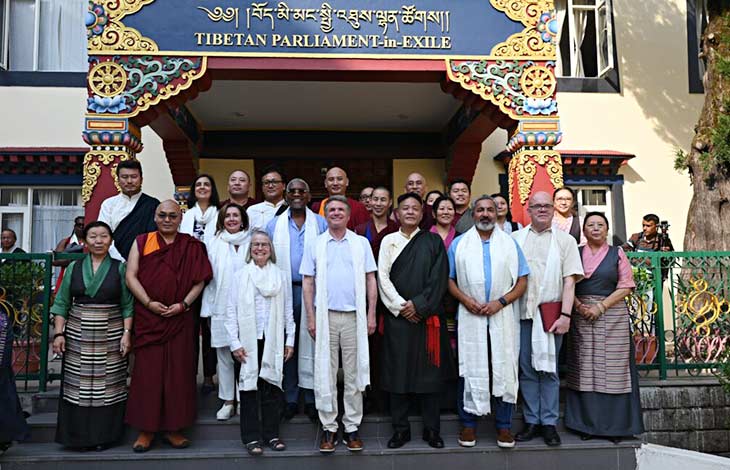In the weeks leading to Congress passing the Promoting a Resolution to the Tibet-China Dispute Act (S.138) in June and the bill’s signature into law by President Biden on July 12, 2024, there was an unusually strong media interest in Tibet, particularly in India. This was further heightened by the visit of a high-level congressional delegation to Dharamsala in June to meet His Holiness the Dalai Lama and the Tibetan leadership. The media directly linked the delegation’s visit to the passage of the legislation, and diverse analyses appeared on the timing and motivation of the American as well as the Indian government.

The congressional delegation meeting with His Holiness the Dalai Lama in Dharamsala on June 19, 2024, Sikyong Penpa Tsering and Secretary Tenzin Taklha are sitting beside the Dalai Lama. (Photo: Tenzin Choejor, OHHDL)
First, what is this new legislation on Tibet? Here, as in the parable of some blind men describing an elephant from their individual perspectives, the legislation is being described by people in different ways, including by President Joe Biden, who issued a statement after signing it into law saying, “The Act does not change longstanding bipartisan United States policy to recognize the Tibet Autonomous Region and other Tibetan areas of China as part of the People’s Republic of China,” a standard narrative of the Administration (see below for congressional refutation of this). The International Campaign for Tibet (ICT) has outlined the actual content and the full text can also be read online.
To me, politically, the Resolve Tibet Act, as the Bill has popularly come to be called, is fundamentally the outcome of a realization by the US Congress that a new initiative to encourage the resolution of the Tibetan issue was needed in the absence of any movement in the past several years. The Bill asserts that “China is failing to meet the expectations of the United States to engage in meaningful dialogue with the Dalai Lama or his representatives or to reach a negotiated resolution that includes the aspirations of the Tibetan people.” The Bill therefore states, “…the dispute between Tibet and the People’s Republic of China must be resolved in accordance with international law, including the United Nations Charter, by peaceful means, through dialogue without preconditions.”
On how such a settlement could be encouraged, the Bill’s premise is that China currently lacks legitimacy in its occupation of Tibet and the only way to attain any form of legitimacy is to resolve the “dispute” through negotiations without preconditions with envoys of H.H. the Dalai Lama. The emphasis on not having any preconditions is because Congress believes the obstacle to a negotiated solution is because the Chinese authorities are “including a demand that he [the Dalai Lama] say that Tibet has been part of China since ancient times, which the Dalai Lama has refused to do because it is inaccurate.”
This leads us to another aspect of the Bill, namely the historical status of Tibet. Point 3 of the Bill’s Statement of Policy says, “the People’s Republic of China should cease its propagation of disinformation about the history of Tibet, the Tibetan people, and Tibetan institutions, including that of the Dalai Lama” and Point 5 of its Findings assert that “The United States Government has never taken the position that Tibet was a part of China since ancient times.”
The Chinese government clearly understood this message from the Bill about Tibet’s historical status. Soon after it becoming law, in addition to the usual reaction issued by the Chinese Foreign Ministry that it “interferes in China’s domestic affairs,” additional responses were also released in the name of the National People’s Congress and the Chinese People’s Political Consultative Conference, both at the national level as well as by the units in the Tibet Autonomous Region. Further, statements were also issued in the name of “experts”. All of these make an effort to assert China’s historical claim over Tibet.
President Biden’s July 12 statement does not challenge the policy position outlined in the Bill about historical independence of Tibet. Rather, the statement appears to be more to placate the Chinese Government. An evidence of this can be seen from the US Embassy in China posting the White House statement both in Chinese and English and, lest the Chinese side miss getting the message, even terming it, “Important statement from President Biden on his signing of the “Promoting a Resolution to the Tibet-China Dispute Act.” “
拜登总统就签署“推进解决藏中争议法案”的重要声明。https://t.co/0phOA4jlFw https://t.co/UYZQF9919p pic.twitter.com/dwySRDrpPj
— Ambassador Nicholas Burns (@USAmbChina) July 15, 2024
In fact, this Bill’s proponents in the Congress specifically wanted to challenge such statements from the Administration as they undermine US position. In a joint op-ed on October 14, 2022, the two House leads, Michael McCaul and Jim McGovern, laid out their reasons for introducing this Bill, “So why do American diplomats continue to say, “Tibet is part of China?” This kind of rhetoric undermines both the US position and the Tibetans’ freedoms. The CCP then uses it to support the lie that “Tibet has been a part of China since ancient times,” and the State Department perpetuates this propaganda by failing to rebut it. Young foreign service officers enter with the impression that, rather than an unresolved conflict, Tibet is an internal matter of China, which is exactly what PRC wants them to think.
“US policy on Tibet has lost its way. That is why we are introducing the Promoting a Resolution to the Tibet-China Conflict Act. The bill would make it US policy that the Tibetan people have a right to determine how they are governed, and ensure that US policymakers accurately treat this issue as an unresolved conflict between Tibet and the PRC, not as an internal affair of China.”
In the light of the Resolve Tibet Act, the Administration now and in the future will have to be categorically clear on the historical independent status of Tibet or else they will be violating the law of the land.
Congressional delegation to Dharamsala
The congressional delegation to Dharamsala in June led by Chairman of the House Foreign Affairs Committee Michael McCaul certainly was connected to the legislation, but not in the way the media projected it. Rather than being a short notice political act to serve a narrow purpose, it was a project, the planning for which started in April 2022.
Sikyong Penpa Tsering, head of the Central Tibetan Administration, and ICT Board Chair Richard Gere were in town in April 2022 for a planned series of meetings, including a strategy session convened by then Speaker Nancy Pelosi. Sikyong Penpa Tsering had brought with him communications from His Holiness the Dalai Lama to the leaders. Among the issues the Sikyong raised were a legislation to update the Tibetan Policy Act, and a visit by a congressional delegation to Dharamsala. Speaker Pelosi and her colleagues, including Rep. Jim McGovern, not only embraced both the proposals, but also began discussions on how to execute them.
As in the past, they also agreed on the importance of bipartisan participation in the initiatives. Among relative new friends of Tibet who the Sikyong and Richard met in April 2022 was Representative Michael McCaul, who was then the ranking member of the House Foreign Affairs Committee. While subsequent meetings indicated McCaul’s own strong personal interest in His Holiness the Dalai Lama and Tibet, one of his staffers then was someone who had worked on our issue for another member of Congress with strong support for Tibet.

Representative Michael McCaul reading the communication from H.H. the Dalai Lama presented to him by Sikyong Penpa Tsering during their meeting in Washington, DC on April 28, 2022. ICT Chair Richard Gere is alongside him.
In a social media posting soon after the meeting with Representative McCaul, Sikyong Penpa Tsering said, “We discussed the critical situation inside Tibet and our collaboration and initiatives moving forward to advance the Tibet cause.”
Had the honour of meeting @RepMcCaul, alongside Richard Gere, Chairman of ICT @SaveTibetOrg. We discussed the critical situation inside Tibet and our collaboration and initiatives moving forward to advance the Tibet cause. pic.twitter.com/QGnOsFHcHL
— Sikyong Penpa Tsering (@SikyongPTsering) April 28, 2022
Representative McCaul not only expressed his readiness on joining the initiative on the legislation, but also expressed his keen interest in visiting Dharamsala. As he tweeted then, he referred to His Holiness as “one of the most inspiring spiritual leaders of our time” and also committed his support saying, “I will continue to stand with Tibetans and all those who suffer under the CCP’s oppression.”
Pleasure meeting with @SikyongPTsering and @SaveTibetOrg Chair Gere to receive a message from the Dalai Lama, one of the most inspiring spiritual leaders of our time. I will continue to stand with Tibetans and all those who suffer under the CCP’s oppression. pic.twitter.com/iZEKGv3enN
— Michael McCaul (@RepMcCaul) April 28, 2022
Thus, the execution of the two plans began simultaneously.
Two and a half months after the meetings, “H.R.8365 Promoting a Resolution to the Tibet-China Conflict Act” was introduced in the House of Representatives on July 13, 2022, with Congressmen Jim McGovern and Michael McCaul as the lead.
Parallelly, discussions were going on between the Office of Tibet and ICT on the one side and congressional offices about the proposed congressional delegation to Dharamsala. Speaker Pelosi was trying to find the convenient time for such a bipartisan delegation.
In the meanwhile, the mid-term elections in November 2022 saw the Republicans taking over the House and McCaul became chair of the House Foreign Affairs Committee.
The first order of business on Tibet in the new Congress was to reintroduce the Resolve Tibet Act. Although senators Jeff Merkley (D-OR) and Todd Young (R-IN) had introduced it in the Senate in December 2022, there was no time to complete the passage before the new Congress began in January 2023.
Thus, at the end of January 2023, we saw the legislation being reintroduced in both the Senate and the House. In 2024 the House passed it in February and the Senate passed it in May with some amendments. This necessitated the House having to vote once more to pass the Senate version, which it did on June 12. One month later, on July 12, 2024 President Biden signed it into law.

Screenshot of the final vote tally in the House of Representatives on the Resolve Tibet Act on June 12, 2024.
Chairman McCaul wanted to do a HFAC delegation that finally began to take shape early this year culminating in their visiting Dharamsala in June. Its members were: Rep. Michael McCaul (R-TX), Chairman, House Foreign Affairs Committee; Rep. Nancy Pelosi (D-CA), Speaker Emerita; Rep. Mariannette Miller-Meeks (R-IA), House Veterans Affairs Committee; Rep. Gregory Meeks (D-NY), Ranking Member, House Foreign Affairs Committee; Rep. Nicole Malliotakis (R-NY), House Ways and Means Committee; Rep. Jim McGovern (D-MA), Ranking Member, House Committee on Rules; and Rep. Ami Bera (D-CA), House Foreign Affairs Committee. The Tibetan community held a public reception for the delegation during which the members spoke about their support for the Dalai Lama and Tibetan people.

The congressional delegation with Tibetan legislative and executive leaders outside the Tibetan parliament house in Dharamsala on June 18, 2024. (Photo: Tenzin Phende, CTA)
It so happened that the timing of the delegation’s visit was soon after the passage of the Resolve Tibet Act by both the House and the Senate. Just as it took more than two years for this bill to be passed and become a law, the congressional delegation was also being worked on for more than two years.
In a statement before the visit, Chairman McCaul said, “This visit should highlight the bipartisan support in the US Congress for Tibet to have a say in their own future.” In the same statement, HFAC Ranking Member Gregory Meeks expanded on the objectives saying, “I’m also honored to have a chance to meet with His Holiness the Dalai Lama and to hear his views on how the American People can help advance the Tibetan people’s struggle for autonomy.”
In general congressional delegations, both by members and by staffers, to Tibet and to the Tibetan community in the Indian subcontinent have played crucial role in the formulation of US programmatic and policy support. Chairman McCaul is the second HFAC chair to lead a delegation to Dharamsala. Way back in August 1997, chair of what was then called House International Relations Committee, Congressman Benjamin A. Gilman (R-NY), led a bipartisan delegation to Dharamsala with Congressmen Gary Ackerman (D-NY) and Eni Faleomavaega (D-AS).

I commend Buchung Tsering’s take on the White House statement upon singing of this bill. Buchung put it in the proper context of the Act of the Congress. I am very confused as to why the Administration has to take a seemingly separate stand as if too eager to please the Chinese.